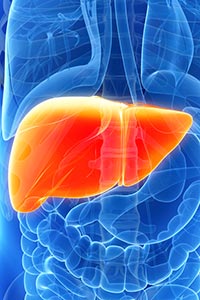Liver Disease

The liver performs many critical metabolic functions, including processing and distribution of nutrients. Liver diseases can be caused by infection, such as hepatitis B and C, or by genetic mutations. Other liver diseases can be triggered by autoimmune reactions or drug toxicity. The rise in obesity in the United States has led to a rise in nonalcoholic fatty liver disease. Many liver diseases place individuals at higher risk for developing liver cancer.
The only current treatment for end-stage liver disease is a liver transplant, and the number of livers available from deceased donors is limited. Thus NIDDK-supported liver research focuses on identifying liver disease early, preserving liver function in people with liver disease, and developing new treatment options, including transplants performed with liver tissue from living donors.
Other NIDDK-funded research is investigating the role gut microbes may play in the progression of nonalcoholic fatty liver disease, and in understanding how the body’s natural killer T cells can activate an immune response to hepatitis B.
In a collaborative effort with the National Library of Medicine, NIDDK has developed LiverTox, an online resource for drug-induced liver injury, providing a “living textbook” with hundreds of case reports, patient information, and a database of over a thousand drugs and supplements.
In addition, NIDDK responds to questions and provides health information about liver disease to people with liver disease and to their families, health professionals, and the public via the NIDDK Health Information Center.
Research Updates and News
- Making New Connections to Address the Silent Epidemic of Nonalcoholic Fatty Liver Disease
- Research Aims to “Triumph” Against Childhood Liver Disease
- Limits on Acetaminophen in Acetaminophen-Opioid Combination Medications Affected Causes of Acute Liver Failure
- Disrupting “talk” amongst liver cells yields therapeutic targets for nonalcoholic fatty liver disease
- Optimizing treatment regimens for adults with chronic hepatitis B
Select Landmark Studies
What We Do
To achieve its mission, NIDDK supports, conducts, coordinates, and plans research. NIDDK also provides data and samples from NIDDK-funded studies and explains research findings to health professionals and the public.
Support Research
NIDDK invests in basic, clinical and translational research and training at colleges, universities and other institutions.
- Digestive Diseases Research Core Centers
- Gastrointestinal, Nutrition, and Liver Research in HIV/AIDS
- Liver Clinical Research and Epidemiology
- Liver Diseases Genetics and Genomics
- Translational and Basic Liver Disease Research
Conduct Research
NIDDK investigators conduct biomedical research and training in the Institute's laboratories and clinical facilities in Maryland and Arizona.
View all Labs & BranchesCoordinate & Plan Research
NIDDK takes multiple approaches to research planning and priority setting.
Meetings & Workshops
View all Meetings & WorkshopsStrategic Plans & Reports
- NIDDK Strategic Plan for Research
- Opportunities & Challenges in Digestive Diseases Research: Recommendations of the National Commission on Digestive Diseases
- The Burden of Digestive Diseases in the United States
- Action Plan for Liver Disease Research
Provide Access to Research Resources
NIDDK makes publicly supported resources, data sets, and studies available to researchers.
View all Research ResourcesProvide Health Information
NIDDK provides patient education information, practice tools for diagnosis and treatment, and statistics.

